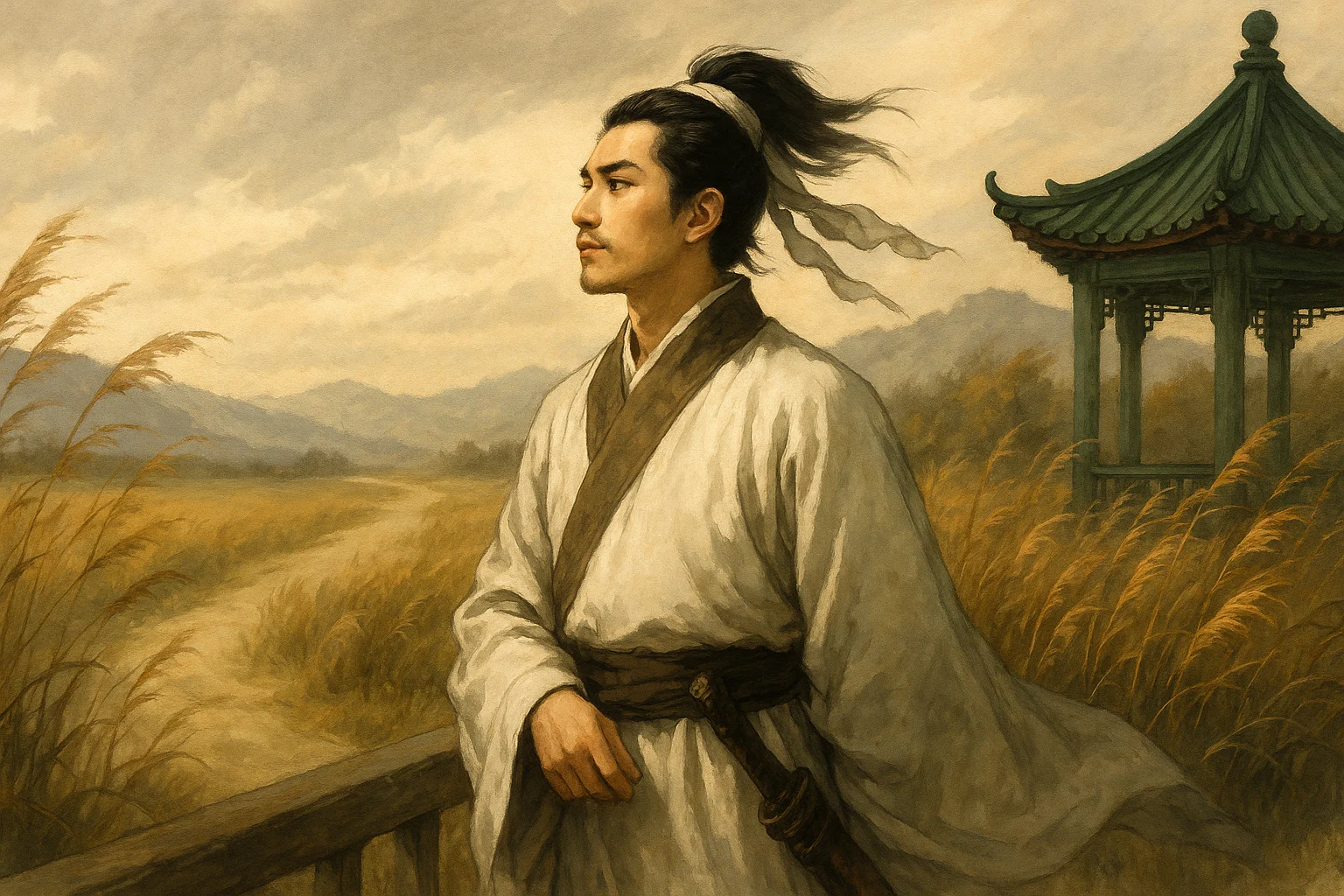I longed for news on the frontier
From day to day, from year to year.
Now nearing home, timid I grow,
I dare not ask what I would know.
Original Poem
「渡汉江」
宋之问
岭外音书断,经冬复历春。
近乡情更怯,不敢问来人。
Interpretation
This poem was composed during the early Tang Dynasty when the poet Song Zhiwen, plagued by political misfortunes and repeated exiles, endured profound life turbulence. It was written as he crossed the Han River during his banishment, nearing his homeland. With homecoming in sight, he was overwhelmed by nostalgia yet seized with apprehension, fearing unwelcome news. These four concise lines perfectly capture a disheartened traveler’s boundless longing for home and his trepidation about returning.
First Couplet: "岭外音书断,经冬复历春。"
Lǐng wài yīnshū duàn, jīng dōng fù lì chūn.
Beyond the mountains, news from home has ceased; I’ve endured winter, now spring repeats.
The opening lines establish the poet’s isolation in exile. “Beyond the mountains” (岭南, Lingnan) and “news ceased” emphasize both geographical and emotional distance from home. “Endured winter, now spring repeats” uses seasonal cycles to underscore the prolonged separation, where the passage of time amplifies his loneliness and silent despair.
Second Couplet: "近乡情更怯,不敢问来人。"
Jìn xiāng qíng gèng qiè, bù gǎn wèn lái rén.
Nearing home, my heart grows timid; I dare not ask travelers for tidings.
While approaching home should bring joy, “my heart grows timid” reveals profound inner conflict. The poet yearns for news yet fears painful revelations, mirroring the psychological torment of prolonged separation. This couplet’s restrained phrasing conveys infinite emotional depth, leaving readers to ponder the unspoken sorrow behind his hesitation.
Holistic Appreciation
The poem masterfully encapsulates a solitary figure's psychological odyssey, achieving profound temporal-spatial fusion through minimalist strokes. The opening couplet's "severed correspondence" (音书断) establishes desolation, while "winters yielding to springs" (经冬历春) traces time's inexorable flow. The concluding lines' paradoxical "increasing trepidation nearer home" (近乡情怯) and muted "unasked questions to passersby" (不敢问来人) reveal complex emotional restraint. Remarkably eschewing direct familial or geographical references, every phrase nonetheless radiates intense nostalgia and psychological tension, rendering this Tang masterpiece an enduring paradigm of homeward-bound anxiety in classical poetics.
Artistic Merits
- Crescendo of Emotional Disclosure
The poem's structural brilliance manifests through four psychological waypoints: from external isolation (音书断) through temporal awareness (经冬历春), progressing to internal conflict (近乡情怯), culminating in behavioral inhibition (不敢问来人)—each phase deepening the emotional resonance. - Linguistic Alchemy
Achieving remarkable semantic density within twenty characters, each line functions as both autonomous emotional capsule and interconnected narrative unit, creating a self-reinforcing emotional ecosystem through precise verbal economy. - Psychological Verisimilitude
The calibrated hesitancy of "trepidation" (情怯) and suspended dialogue in "dare not inquire" (不敢问) anatomize the exile's ambivalent homecoming psyche—where anticipation wars with apprehension—demonstrating unparalleled psychological insight in regulated verse form.
Insights
This poetic miniature unveils fundamental truths about displacement: that homecoming's joy often carries invisible weights of uncertainty, and time's passage transforms both places and perceptions. The traveler's paradoxical reticence when nearing their destination suggests our deepest longings sometimes breed their own restraints. Beyond classical literati concerns, the work speaks universally to modern transience—reminding us that true belonging requires not just physical return, but the courage to confront changed realities and the ghosts of expectation. In twenty meticulously chosen characters, Song Zhiwen immortalized the eternal human tension between roots and routes.
Poem translator
Xu Yuanchong (许渊冲)
About the Poet

Song Zhiwen (宋之问, 656 – 712 CE), a native of Fenyang, Shanxi (some records suggest Lingbao, Henan). Song Zhiwen attained the jinshi degree in 675 CE. In 708 CE, he was reassigned as Vice Director (yuanwailang) of the Bureau of Evaluations (kaogong) and appointed an Academician of the Institute for the Advancement of Literature alongside Du Shenyan and Xue Ji, only to be demoted again to Vice Prefect (changshi) of Yuezhou for accepting bribes. In 710 CE, Song Zhiwen was exiled to Qinzhou, and Emperor Xuanzong ordered his execution in 712 CE.












